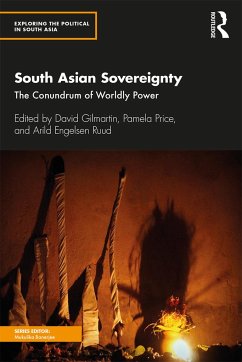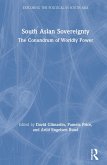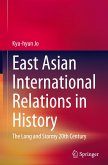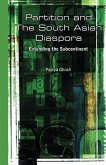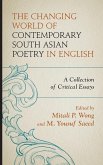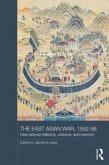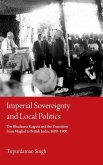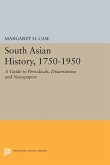South Asian Sovereignty
The Conundrum of Worldly Power
Herausgeber: Gilmartin, David; Ruud, Arild Engelsen; Price, Pamela
South Asian Sovereignty
The Conundrum of Worldly Power
Herausgeber: Gilmartin, David; Ruud, Arild Engelsen; Price, Pamela
- Broschiertes Buch
- Merkliste
- Auf die Merkliste
- Bewerten Bewerten
- Teilen
- Produkt teilen
- Produkterinnerung
- Produkterinnerung
This book brings ethnographies of everyday power and ritual into dialogue with intellectual studies of theology and political theory. It underscores the importance of academic collaboration between scholars of religion, anthropology and history in uncovering the structures of thinking and action that make politics work.
Andere Kunden interessierten sich auch für
![South Asian Sovereignty South Asian Sovereignty]() South Asian Sovereignty180,99 €
South Asian Sovereignty180,99 €![East Asian International Relations in History East Asian International Relations in History]() Kyu-hyun JoEast Asian International Relations in History90,99 €
Kyu-hyun JoEast Asian International Relations in History90,99 €![Partition and the South Asian Diaspora Partition and the South Asian Diaspora]() Papiya GhoshPartition and the South Asian Diaspora67,99 €
Papiya GhoshPartition and the South Asian Diaspora67,99 €![The Changing World of Contemporary South Asian Poetry in English The Changing World of Contemporary South Asian Poetry in English]() The Changing World of Contemporary South Asian Poetry in English121,99 €
The Changing World of Contemporary South Asian Poetry in English121,99 €![The East Asian War, 1592-1598 The East Asian War, 1592-1598]() The East Asian War, 1592-1598230,99 €
The East Asian War, 1592-1598230,99 €![Imperial Sovereignty and Local Politics Imperial Sovereignty and Local Politics]() Tripurdaman SinghImperial Sovereignty and Local Politics89,99 €
Tripurdaman SinghImperial Sovereignty and Local Politics89,99 €![South Asian History, 1750-1950 South Asian History, 1750-1950]() Margaret CaseSouth Asian History, 1750-195066,99 €
Margaret CaseSouth Asian History, 1750-195066,99 €-
-
-
This book brings ethnographies of everyday power and ritual into dialogue with intellectual studies of theology and political theory. It underscores the importance of academic collaboration between scholars of religion, anthropology and history in uncovering the structures of thinking and action that make politics work.
Hinweis: Dieser Artikel kann nur an eine deutsche Lieferadresse ausgeliefert werden.
Hinweis: Dieser Artikel kann nur an eine deutsche Lieferadresse ausgeliefert werden.
Produktdetails
- Produktdetails
- Verlag: Routledge India
- Seitenzahl: 246
- Erscheinungstermin: 9. August 2019
- Englisch
- Abmessung: 234mm x 156mm x 13mm
- Gewicht: 380g
- ISBN-13: 9780367312701
- ISBN-10: 0367312700
- Artikelnr.: 57497290
- Herstellerkennzeichnung
- Libri GmbH
- Europaallee 1
- 36244 Bad Hersfeld
- gpsr@libri.de
- Verlag: Routledge India
- Seitenzahl: 246
- Erscheinungstermin: 9. August 2019
- Englisch
- Abmessung: 234mm x 156mm x 13mm
- Gewicht: 380g
- ISBN-13: 9780367312701
- ISBN-10: 0367312700
- Artikelnr.: 57497290
- Herstellerkennzeichnung
- Libri GmbH
- Europaallee 1
- 36244 Bad Hersfeld
- gpsr@libri.de
David Gilmartin is Distinguished Professor of History at North Carolina State University, USA. His current research focuses on the legal history of India's electoral institutions as they have evolved from a colonial past and changed in relation to evolving visions of the people's sovereignty. His earlier books include Blood and Water: The Indus River Basin in Modern History (2015), Civilization and Modernity: Narrating the Creation of Pakistan (2014), and Empire and Islam: Punjab and the Making of Pakistan (1988). Pamela Price is Professor Emerita of South Asian History at the University of Oslo, Norway. She began her research on political culture working on colonial South India and has published, among others, Kingship and Political Practice in Colonial India (1996). Moving onto post-colonial topics, she edited Power and Influence in India: Bosses, Lords and Captains (2010, with Arild Engelsen Ruud). A collection of her articles appears in State, Politics, and Cultures in Modern South India: Honour, Authority, and Morality (2013). Arild Engelsen Ruud is Professor of South Asia Studies at the University of Oslo, Norway. He writes on issues of democracy and politics in South Asia, specifically West Bengal and Bangladesh. He is the author of Poetics of Village Politics: The Making of West Bengal's Rural Communism (2003), co-editor of Power and Influence in India (2010, with Pamela Price), and co-author of Mafia Raj (2018, with Lucia Michelutti et al.).
Introduction: South Asian Sovereignty: The Conundrum of Worldly Power Part
I. Law, Religion and Sovereignty in India 1. Sovereign Struggles:
Governance and Mathas under British Imperial Rule in South India 2. The
Guru as Legislator: Religious Leadership and Informal Legal Space in Rural
South India 3. Time and the Sovereignty of the People Part II. Kingship
Reconfigured 4. Deities, Alliances and the Power over Life and Death:
Exploring Royal Sovereignty and its Tenacity in a Former Princely State in
Odisha 5. Dynastic Continuity and Election in Contemporary Karnataka
Politics 6. Circuits of Protection and Extortion: Sovereignty in a
Provincial North Indian Town Part III. The Nation and the Sovereign
Imagination 7. Messianism and the Constitution of Pakistan 8. Sovereign
Sensibilities: Gunday and the Nation as the Self. Afterword: We Have Other
Ideas
I. Law, Religion and Sovereignty in India 1. Sovereign Struggles:
Governance and Mathas under British Imperial Rule in South India 2. The
Guru as Legislator: Religious Leadership and Informal Legal Space in Rural
South India 3. Time and the Sovereignty of the People Part II. Kingship
Reconfigured 4. Deities, Alliances and the Power over Life and Death:
Exploring Royal Sovereignty and its Tenacity in a Former Princely State in
Odisha 5. Dynastic Continuity and Election in Contemporary Karnataka
Politics 6. Circuits of Protection and Extortion: Sovereignty in a
Provincial North Indian Town Part III. The Nation and the Sovereign
Imagination 7. Messianism and the Constitution of Pakistan 8. Sovereign
Sensibilities: Gunday and the Nation as the Self. Afterword: We Have Other
Ideas
Introduction: South Asian Sovereignty: The Conundrum of Worldly Power Part
I. Law, Religion and Sovereignty in India 1. Sovereign Struggles:
Governance and Mathas under British Imperial Rule in South India 2. The
Guru as Legislator: Religious Leadership and Informal Legal Space in Rural
South India 3. Time and the Sovereignty of the People Part II. Kingship
Reconfigured 4. Deities, Alliances and the Power over Life and Death:
Exploring Royal Sovereignty and its Tenacity in a Former Princely State in
Odisha 5. Dynastic Continuity and Election in Contemporary Karnataka
Politics 6. Circuits of Protection and Extortion: Sovereignty in a
Provincial North Indian Town Part III. The Nation and the Sovereign
Imagination 7. Messianism and the Constitution of Pakistan 8. Sovereign
Sensibilities: Gunday and the Nation as the Self. Afterword: We Have Other
Ideas
I. Law, Religion and Sovereignty in India 1. Sovereign Struggles:
Governance and Mathas under British Imperial Rule in South India 2. The
Guru as Legislator: Religious Leadership and Informal Legal Space in Rural
South India 3. Time and the Sovereignty of the People Part II. Kingship
Reconfigured 4. Deities, Alliances and the Power over Life and Death:
Exploring Royal Sovereignty and its Tenacity in a Former Princely State in
Odisha 5. Dynastic Continuity and Election in Contemporary Karnataka
Politics 6. Circuits of Protection and Extortion: Sovereignty in a
Provincial North Indian Town Part III. The Nation and the Sovereign
Imagination 7. Messianism and the Constitution of Pakistan 8. Sovereign
Sensibilities: Gunday and the Nation as the Self. Afterword: We Have Other
Ideas

